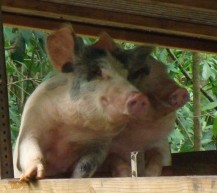Swine Precautions Issued After Variant Virus on Maui
By Wendy Osher
Authorities from both the Hawai’i Departments of Health and Agriculture issued recommendations today following the recent confirmation of the variant flu (H3N2V) on Maui.
The virus was confirmed in an adult patient on Maui in July , who had been in close contact with domestic swine on the island. The patient has since fully recovered, and did not require hospitalization, state health officials said.
Public health and animal health officials say there are concerns over larger outbreaks that have occurred recently in other states, including Indiana and Ohio.
The recommendations also come as the county prepares for the annual Maui Fair taking place at the end of September.
The following actions are recommended at events, programs, and other settings where there may be contact between humans and swine.
Recommendations for the Public:
- People at high risk for influenza complications should consider avoiding exposure to pigs this season. This includes individuals with underlying chronic medical conditions, those that are pregnant, younger than five years, older than 65 years or those with weakened immune systems.
- People involved in activities that may involve swine contact should: Wash their hands frequently with soap and running water before and after contact with animals; Avoid eating, drinking or putting anything in your mouth in animal areas; and avoid close contact with animals that look or act ill.
- Use hand-wash stations in and around livestock areas according to instructions.
- Avoid contact with pigs if you are experiencing flu-like symptoms. It is also important that humans not spread diseases to pigs.
- For those who do come in contact with pigs avoid touching your face, and wash hands frequently.
- People who experience influenza-like symptoms within seven days following direct or close contact with pigs and who seek medical care should inform their health care provider about the exposure.
Show Management Organizing Animal Events:
- Should report any unusual disease occurrences that occur at the fair in people to the Hawai`i Department of Health and in animals to the Hawai’i Department of Agriculture’s State Veterinarian respectively.
- Should insure that signage about proper hygienic practices is posted widely and prominently in and around livestock areas and hygienic stations with running water, soap and instructions for use are strategically placed.
- Managers of individual fairs may adopt requirements which are more stringent than those recommended by the department, and all exhibitors are encouraged to check with the organizers of each fair in advance to ensure compliance with all requirements.
Rrecommendations for Swine Exhibitors, Livestock Program and Show Managers:
- The HDOA recommends that exhibitors of all animals discuss the health of their animals, including vaccine recommendations, with a veterinarian on a regular basis.
- All swine entering fairs and exhibits should be vaccinated for swine influenza (H3N2 and H1N1 or any newer multivalent influenza vaccine) and for any other diseases as recommended by your veterinarian. Vaccination against various infectious agents affecting swine is an important herd health management tool.
- All swine upon arrival and for the duration of fairs and exhibits should be evaluated by event veterinarians, university extension agents or livestock show managers. Any sick swine should be removed from the event back to their premise of origin and held in isolation.
- HDOA’s State Veterinarian should be notified by management of sick swine discovered at these events. HDOA recommends that animals removed from or returning home from fairs be isolated from other members of the herd for two to four weeks to help prevent the spread of disease.
Questions concerning human health can be directed to the DOH Disease Investigation Branch Duty Officer at 808-586-4586.
To report suspected animal health issues, contact HDOA’s Animal Disease Control Branch on O`ahu at (808) 483-7106 during normal business hours, or after hours call (808) 837-8092.
*** Supporting information courtesy Hawai’i State Department of Health.










